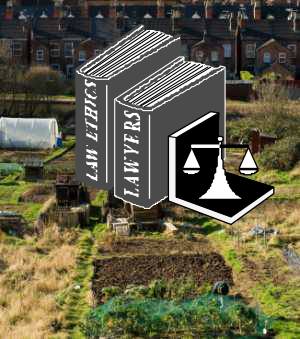A look at allotment letting agreements, what these agreements cover and the legal aspects of leasing an allotment.

Allotment plots all have a lease which sets out what is expected of the tenants as well as their legal rights.
By Sarah Gill, legal blogger from Clickdocs, one of the UK’s leading on-line suppliers of professionally drafted legal documents. Clickdocs offers templates for small businesses, landlords, employers and individuals looking to manage their own legal affairs.
Spring is in the air and allotment holders will be planning out their gardens in preparation for the warmer weather. Many allotment holders have allotment letting agreements with the allotment provider, so here we take a look at what these agreements cover and the legal aspects of leasing an allotment.
Tenancy agreement
Allotment letting agreements are a form of tenancy agreement. The tenancy agreement is a legally binding document setting out the rights and responsibilities of the plot holder. Common clauses include rent, duration of the lease and termination, undertakings of the allotment holder as well as permissible activities, the building of structures and subletting issues.
Allotment Rent
Allotment holders are required to pay rent, which the law says should be at such a rate ‘as a tenant may reasonably be expected to pay for the land’. The yearly rent can range from £5 to £125 and the landlord is responsible for the payment of water rates and general maintenance.
Duration of lease and ending the tenancy
Allotments are usually leased for the period of one year, although they can be renewed indefinitely.
The Allotments Act 1922 provided allotment holders with some security of tenure by setting out specific periods of notice for ending a tenancy. Landlords could only end an allotment garden tenancy by giving the allotment holder a minimum of six months’ notice. This was increased to 12 months by the Allotments Act 1950. The landlord may end the tenancy by giving one month’s notice where the allotment holder has breached any of the conditions of the tenancy agreement.
Permissible activities
The tenancy agreement will set out the obligations of the allotment holder and what they can or cannot do. Obligations include:
- keeping the plot free of weeds and keeping it in good condition;
- not to use the allotment for the purpose of any trade or business;
- not to cause any nuisance or annoyance to the occupiers of other allotments or obstruct any path used by the other occupiers of surrounding allotments;
- not to sublet the plot without the written consent of the landlord;
- not to build any structures without the written consent of the landlord.
Hens and rabbits
Until 1950 there were restrictions on keeping hens and rabbits on allotments but these were abolished by the Allotments Act 1950. The Act does not refer to cockerels but to hens only. Hens and rabbits are permitted provided that they are not prejudicial to health or a nuisance and do not affect the operation of any other law e.g. animal welfare legislation.
Sunday gardening
Sundays are now the most popular gardening day but in the 19th century it was forbidden to garden on the Sabbath in some Parishes.
A tenancy agreement dated 1846 from the Parish of Husbands Bosworth states: “Every occupier is expected to attend divine service on Sundays; and any occupier who digs potatoes or otherwise works on his land on Sunday shall immediately forfeit the same.”
Allotment Information
- Allotment & Garden Paths
- Allotment Growing as You Get Older
- Allotment History – A Brief History of Allotments in the UK
- Allotment History – Cultivating a 19th Century Allotment by Dr Lesley Acton MA Ph.D
- Allotment History – The First Allotments by Dr Lesley Acton MA Ph.D
- Allotment Journey – A Step to Sustainable Living
- Allotment Regeneration – Case Study
- Allotments & Children
- Allotments & The Law – Legal Aspects of An Allotment
- Allotments – Some Tips to Get You Started
- Clearing a New Allotment or Vegetable Plot
- Cuban Vegetable Growing Practices can Benefit your Allotments
- Finding an Allotment – How to Find an Allotment
- Health and Safety in the Allotment & Garden
- Here is How Having and Maintaining a Back Garden Allotment Could Help You to Sell Your Home
- How to Create a Charming Sitting Area in Your Allotment
- How to Ensure the Security of your Allotment
- How To Pick The Right Shed For Your Allotment
- How to reduce the costs of running your allotment
- Improving Security on Allotments to combat Vandalism and Theft
- The Allotment – The City Dwellers bit of Country
- Vacant Allotment Plots – What To Do With Them?
- Why People Grow Our Own – Our Plots
- You Have a New Allotment!



